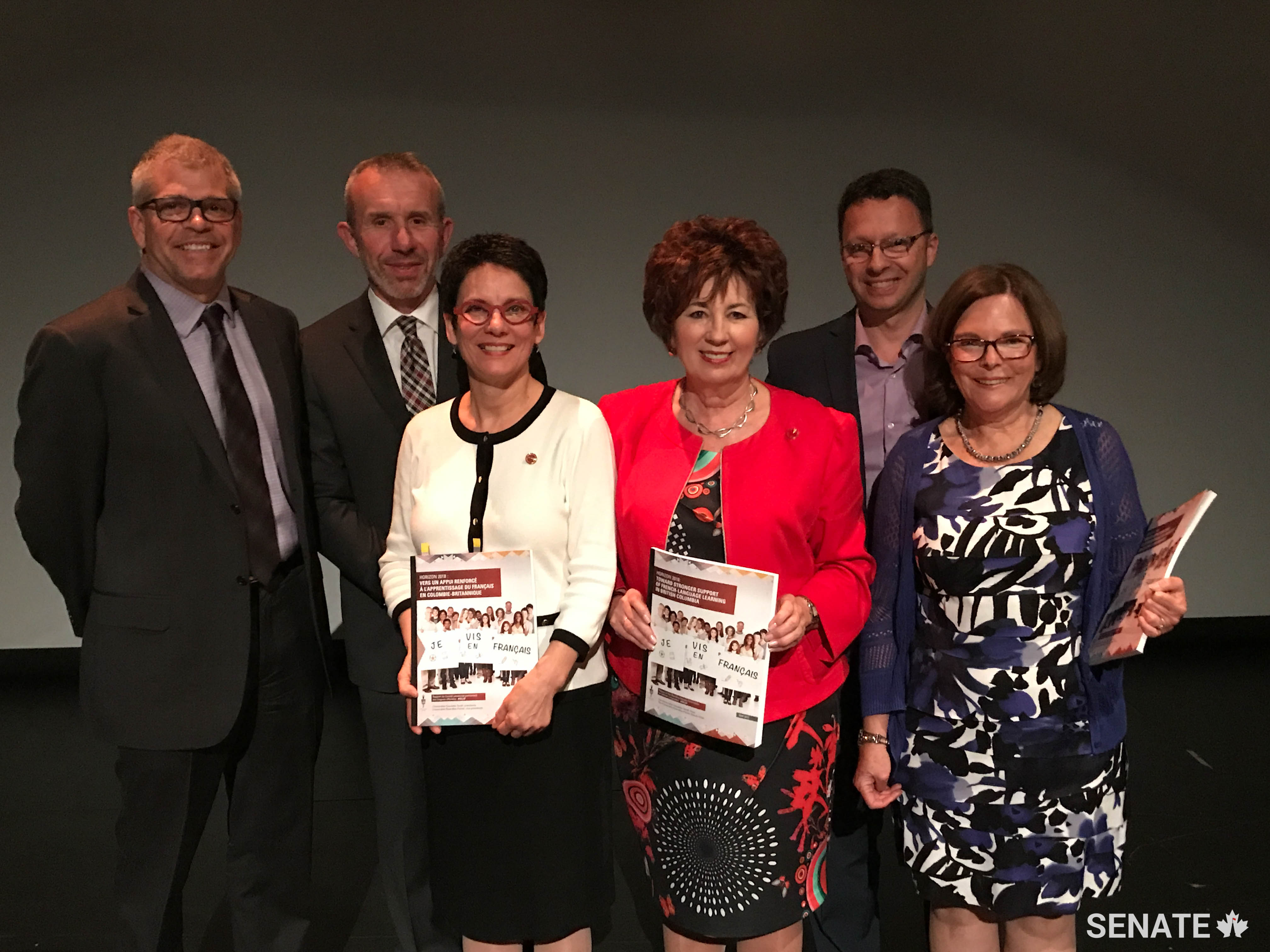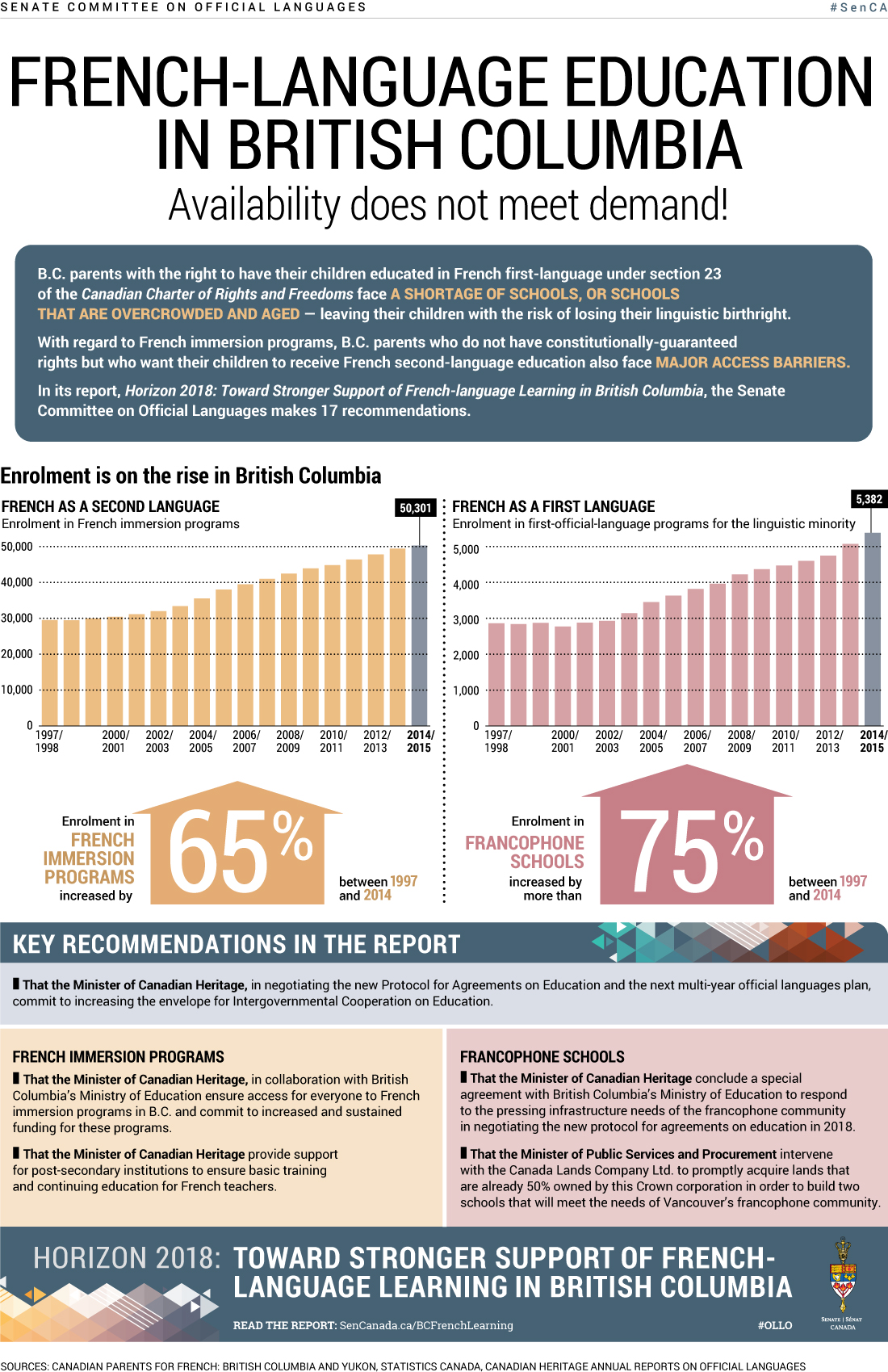Urgent demand for French education in B.C. unfulfilled

The federal government is not assuming its leadership role to ensure access to French first-language and French second-language education in British Columbia, the Senate Committee on Official Languages said in a report released today.
The committee’s report, Horizon 2018: Toward Stronger Support of French-language Learning in British Columbia, makes 17 recommendations on which the federal government should act in order to live up to its obligations under the Canadian Charter of Rights and Freedoms and under the Official Languages Act. The B.C. government, with federal government support, should also work with French-language education stakeholders to implement the report’s recommendations.
The committee’s recommendations apply to francophone schools, French immersion programs and B.C.’s French-speaking community, including francophones and francophiles, and the support to which they are entitled.
B.C. parents with the right to have their children educated in French first-language under section 23 of the Charter face a shortage of schools, or schools that are overcrowded and aged — leaving their children with the risk of losing their linguistic birthright.
With regard to French immersion programs, B.C. parents who do not have constitutionally-guaranteed rights but who want their children to receive French second-language education also face major access barriers.
The federal government must commit to fostering the full recognition and use of French, one of Canada’s two official languages, as well as to supporting the development of B.C.’s francophone community.
It is essential for the federal government, with the support of its provincial counterpart, to oversee the implementation of constitutionally-guaranteed rights by ensuring citizen’s access to French first-language education, from early childhood to post-secondary. It is also necessary to give the opportunity for all young Canadians to become bilingual by giving them access to French immersion programs.
In 2018, the federal government will renegotiate the Protocol for Agreements for Minority-Language Education and Second-Language Instruction with the provinces and territories.
It is an opportunity for the federal and provincial governments to prove they are serious about addressing the inadequacies present in B.C. and across the country. The next multi-year official languages plan will also be announced in 2018.
In this context, the commitment to promoting Canada’s two official languages, which are the core of the Canadian identity, must be resoundingly restated.



Related articles
Tags
Committee news
Urgent demand for French education in B.C. unfulfilled

The federal government is not assuming its leadership role to ensure access to French first-language and French second-language education in British Columbia, the Senate Committee on Official Languages said in a report released today.
The committee’s report, Horizon 2018: Toward Stronger Support of French-language Learning in British Columbia, makes 17 recommendations on which the federal government should act in order to live up to its obligations under the Canadian Charter of Rights and Freedoms and under the Official Languages Act. The B.C. government, with federal government support, should also work with French-language education stakeholders to implement the report’s recommendations.
The committee’s recommendations apply to francophone schools, French immersion programs and B.C.’s French-speaking community, including francophones and francophiles, and the support to which they are entitled.
B.C. parents with the right to have their children educated in French first-language under section 23 of the Charter face a shortage of schools, or schools that are overcrowded and aged — leaving their children with the risk of losing their linguistic birthright.
With regard to French immersion programs, B.C. parents who do not have constitutionally-guaranteed rights but who want their children to receive French second-language education also face major access barriers.
The federal government must commit to fostering the full recognition and use of French, one of Canada’s two official languages, as well as to supporting the development of B.C.’s francophone community.
It is essential for the federal government, with the support of its provincial counterpart, to oversee the implementation of constitutionally-guaranteed rights by ensuring citizen’s access to French first-language education, from early childhood to post-secondary. It is also necessary to give the opportunity for all young Canadians to become bilingual by giving them access to French immersion programs.
In 2018, the federal government will renegotiate the Protocol for Agreements for Minority-Language Education and Second-Language Instruction with the provinces and territories.
It is an opportunity for the federal and provincial governments to prove they are serious about addressing the inadequacies present in B.C. and across the country. The next multi-year official languages plan will also be announced in 2018.
In this context, the commitment to promoting Canada’s two official languages, which are the core of the Canadian identity, must be resoundingly restated.





